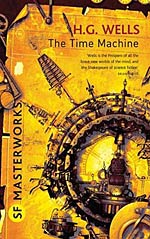
![]() Darling
Darling
6/1/2012
![]()
This has been my third time through The Time Machine. I forget too much of it each time. Some of the dumb stuff Hollywood has done to foul it up has leaked into my memories of the actual book, so I get confused. However, this book has much more to offer than it's premise indicates. A device that has become a trope in modern SF was, at the time deeply innovative. Thanks to Einstein, we now nearly dismiss the whole idea as absurd. And that would be all fine and good if that's what Wells was about, but it wasn't.
Wells was deeply interested, as a student of Thomas Huxley (Darwin's Bulldog), in considering the future fate of man as he evolves. He was also a socialist embroiled in a world where communism was on the rise, a philosophy he vehemently disagreed with (a reminder to us all that the terms are not synonymous). So when his nameless "everyman" arrives in the future to find the dark symbiosis of the Eloi and the Moorlocks, it is to bring back a cautionary tale.
His initial foray among the Eloi is understandably superficial. They are a beautiful, simple people given to pleasure. It is only on further reflection that the Time Traveller realizes they must have an industry of some sort or their material culture would be nonexistant. With the dissappearance of his time machine, he explores and discovers the darkness that lurks beneath.
He has stumbled (literally) into a world where the decadence of humanity is causing it to devour itself with its own unreconciled duality. Its beauty is past its prime, shallow and meaningless. It's industry is hideous, creeping and cannibalistic. There is nothing of the light hearted "what if" tale in The Time Machine. It is rather a warning that humankind must draw together or suffer the consequences.
I am not an evolutionist, but I am a firm believer in the laws of consequence. If the rich get richer and the poor get poorer, sooner or later the poor will no longer tolerate the divide. If the intellectual and the artistic insist on an elitist disconnect, the practical man will sooner or later allow him to wander into his own illusory dreamworld. In a world like that, uninformed power becomes a thing to be feared.
There is nothing of Marxist dialectic in Wells either. He does not suggest that the Moorlocks and the Eloi should try to get along or reintegrate, drawing the best from each other. There is no best. The Eloi are empty and the Moorlocks are savage. Both are beyond hope. The Time Traveler is drawn to the Eloi as all of us are drawn to sunlight rather than shadow, ease rather than work, sight rather than blindness. This suggestion that a point of no return can be reached without realization is the loudest warning of all. If we don't pay attention now, while something can be done, we are swept into the wild fire that kills both humanity's sensitivity and brutality. And the wild fire is lit by a lack of forethought, by reason misused.
In the 1986 Tor edition additional material by James Gunn (an expert writer in his own right) explores Wells' life and influence as well as his ideas about the future that so influenced The Time Machine. It is a beautifully useful devise that helps the reader move beyond the novelty of the story and to pay attention to the Time Traveller's asides reading them as the voice of Wells himself. Even his self-contradictory childhood contributes to his own familiarity with the Eloi, Moorlock contradiction.
The Time Machine is such a pillar in the SF cannon that it is beyond recommendation by any individual, but I recommend it anyway. As Mark Twain observed a "classic" is "A book which people praise and don't read." This book is in danger of falling into disfavor for its naivette' and its linguistic obsolescence. Even its victorian masculine perspective is a threat. Never the less, it's profundity is in its cautionary word, its philosophy more than its specific speculation. It's short. Read it and relive the wonder.